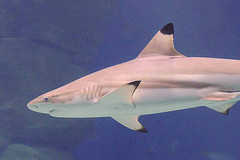Surprising discovery of hybrid sharks
 Scientists have discovered not one but fifty seven of the world's first hybrid sharks in Australia. When something is hybrid it means it is made up of two different things. Hybrid cars use two types of fuel for example. This shark is a hybrid of the Australian blacktip and the common blacktip - two separate species.
Scientists have discovered not one but fifty seven of the world's first hybrid sharks in Australia. When something is hybrid it means it is made up of two different things. Hybrid cars use two types of fuel for example. This shark is a hybrid of the Australian blacktip and the common blacktip - two separate species.
Multiple generations of this new shark were found in five locations along the Australian coast which means that the new hybrid is doing well. The Australian blacktip is the smaller of the two sharks that make up the hybrid. Measuring an average 2m this blacktip prefers warmer tropical waters. In contrast, the common black tip is larger at 2.5m and likes to swim about in the cooler sub-tropical regions.
Some say that this new hybridisation is a reaction to climate change and the changing temperatures of the sea, although it is impossible to know why these two sharks have chosen to team up. If this new breed of shark isn't a direct reaction to global warming, it is believed that its mix of genes will certainly make it stronger and better able to cope with environmental changes in the future.
These sharks aren't dangerous to humans but certainly look the part with their steely eyes, pointy heads and long sleek bodies. They're called blacktips because of the black tips on their dorsal and pectoral fins. How long these new sharks have existed is a mystery but it goes to show how much there is to discover out there!
The common blacktip shark is listed as near threatened on the IUCN's Red List. They live in shallow tropical waters which means that they often get caught up in fishing nets and with a low reproduction rate they could soon be under threat due to overfishing.
Read More: Tropical Birds